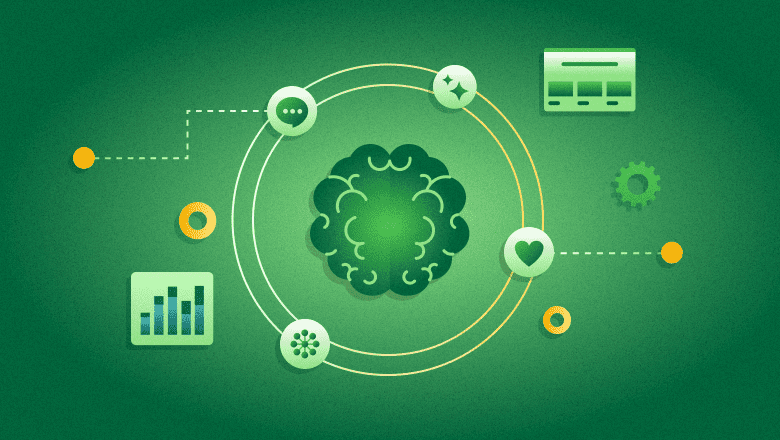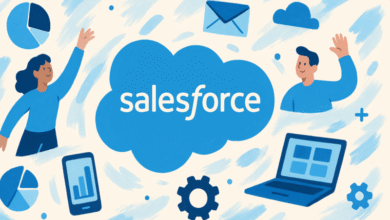Automate Your Marketing with AI-Powered Workflows

▼ Summary
– AI marketing automation uses artificial intelligence to create dynamic systems that execute, personalize, and optimize marketing campaigns based on real-time data and predictive intelligence.
– It provides key benefits including saving time on manual tasks, delivering advanced personalization at scale, and enabling data-driven decision-making for more effective campaigns.
– The technology encompasses various tools such as AI content generation, predictive analytics, customer journey automation, social listening, and chatbots to address specific marketing challenges.
– Successful implementation requires starting with small, measurable pilot projects to demonstrate ROI and gain team buy-in, while ensuring ethical use and integration with existing systems.
– Platforms like Sprout Social integrate AI across publishing, engagement, and analytics to streamline workflows and turn social data into actionable insights without creating silos.
The landscape of marketing is undergoing a profound transformation, driven by the integration of artificial intelligence into core workflows. AI marketing automation represents a significant leap beyond traditional rule-based systems, introducing intelligent platforms that learn, adapt, and optimize campaigns in real time. For marketing leaders grappling with the demands for efficiency, personalization, and data-driven insights, these tools offer a powerful solution. An overwhelming majority of industry leaders now recognize proficiency in AI as an indispensable skill for navigating the modern marketing environment.
This technology fundamentally redefines marketing automation. Instead of following a static set of predetermined rules, AI-powered systems utilize machine learning to analyze vast datasets of customer behavior. They identify patterns, predict future actions, and dynamically adjust marketing efforts accordingly. The system continuously refines its approach with every new piece of data, creating a truly responsive and intelligent marketing engine.
The capabilities enhanced by this technology are extensive. They include predictive analytics for forecasting customer value and churn risk with remarkable precision. AI enables advanced segmentation that moves beyond basic demographics to incorporate behavioral and psychological factors. It powers real-time personalization, delivering content tailored to individual preferences the moment they are most receptive. Workflow automation is elevated, with campaigns adjusting autonomously based on performance data. Furthermore, AI provides sophisticated social listening to track trends and sentiment, alongside AI-driven publishing that optimizes everything from post timing to messaging for maximum engagement.
Consider the difference in social media scheduling. A traditional approach relies on a fixed calendar, while an AI-powered system analyzes engagement signals, such as likes, shares, and scroll behavior, to determine the optimal time to publish. This intelligent adaptation consistently drives higher reach and engagement because it learns audience habits instead of adhering to a rigid schedule.
The Compelling Advantages of AI-Driven Automation
Marketing teams consistently face challenges like limited resources, the expectation of personalized experiences, and the pressure to demonstrate clear return on investment. AI-driven automation directly addresses these pain points while unlocking new levels of efficiency and growth.
- Significant Time Savings and Reduced Manual Labor
- Advanced Personalization at Scale
- Empowering Data-Driven Decisions
- Alleviating Creative Burnout
- Enhanced Segmentation and Targeting
- Efficient Campaign Scaling
- Unified Visibility and Collaboration
Categories of AI Marketing Tools
Understanding the different types of AI marketing tools helps in selecting the right solutions for specific challenges.
AI Content Generation and Editing: These tools leverage natural language processing to generate initial drafts, suggest precise edits, and optimize copy for targeted audiences and specific channels. They are capable of adapting to a brand’s established voice, thereby significantly streamlining the entire content creation process.
Navigating Implementation Challenges
Adopting any new technology inevitably presents hurdles, but anticipating these challenges leads to a much smoother rollout.
Building Internal Buy-in: Resistance within an organization often stems from concerns about return on investment (ROI), security implications, or the impact on current job roles. To mitigate this, start with a small, high-impact pilot project, such as automating the triage of social media responses. Track clear, measurable metrics like staff hours saved or improved customer response times. Demonstrating these tangible wins is the most effective strategy for turning skeptics into advocates.
A Framework for Getting Started
A successful AI implementation always begins with a focused and manageable approach.
Identify Time-Consuming Manual Workflows: The first step is to pinpoint specific repetitive tasks that are known to create bottlenecks. Examples include the manual process of cross-platform content publishing or sorting and prioritizing high volumes of customer responses.
How an Integrated Platform Streamlines Social Strategy
For social media teams, an integrated platform that weaves AI into existing workflows is far more effective than managing a collection of disconnected point solutions. Such a platform can enhance publishing, engagement, listening, and analytics from a single interface, eliminating data silos and maintaining strategic consistency.
Key features might include an AI assistant that generates on-brand copy and repurposes top-performing content, saving significant time while maintaining quality. A smart inbox can use AI to automatically categorize and prioritize incoming messages, surfacing suggested replies that feel natural and routing urgent issues to the right team member promptly. Furthermore, AI-powered listening can analyze millions of conversations to spot emerging trends and shifts in sentiment, linking social performance directly to business outcomes.
The ultimate goal of AI marketing automation is to augment human creativity and strategic judgment, not replace it. By handling repetitive tasks and uncovering deep insights, these tools free up marketing teams to focus on what they do best: building innovative campaigns and fostering genuine customer connections. The journey begins with a single, well-chosen workflow improvement that demonstrates clear value, paving the way for purposeful expansion and measurable ROI.
(Source: Sprout Social)





